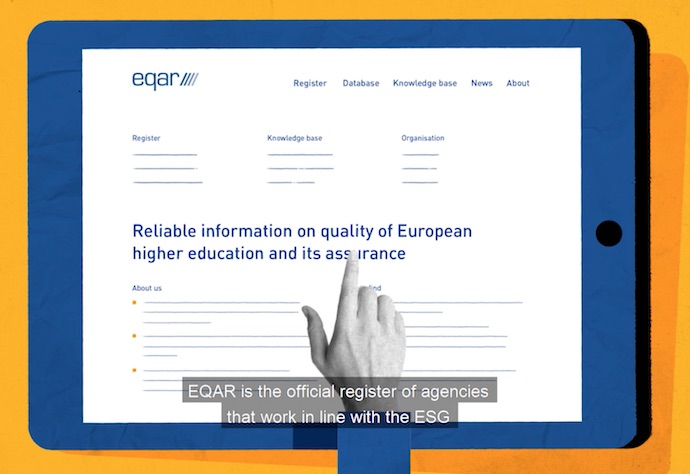
EQAR statement on the outcome of MFHEA’s application
EQAR drafted a statement to address the public statements and media articles related to MFHEA’s application for registration on EQAR.
In light of several media articles published over the course of the last several days regarding the decision of the Register Committee to reject Malta Further and Higher Education Authority’s (MFHEA) application for registration on EQAR, as well as the official press release from the agency itself, EQAR finds that some of the statements presented within these articles misrepresent the role of EQAR and the outcomes of agency reviews for the purpose of EQAR registration.
We are therefore obliged to clarify and correct several matters presented in the public discourse on this matter.
1. Context
EQAR was established within the Bologna Process as the European Higher Education Area’s (EHEA) public and official register of QA agencies compliant with the Standards and Guidelines for Quality Assurance in the European Higher Education Area (ESG).
As part of the registration process, EQAR evaluates whether the agencies are substantially compliant with the ESG. Registration of quality assurance agencies in EQAR enhances transparency, mutual trust and facilitates the recognition of qualifications and other forms of collaboration in the EHEA.
Consequently, it is important to keep the following in mind.
2. EQAR registration and ESG compliance
Registration on EQAR is voluntary, as is the case with the Bologna Process as a whole. While there is no legal obligation for agencies to be compliant with the ESG and to register, this does not lessen the importance of ESG compliance nor of the EQAR registration which demonstrates it. The ESG are the framework for external and internal quality assurance to which all EHEA ministers responsible for education committed in the Bergen Communique in 2005.
Furthermore, EQAR’s statement that “the fact that an agency is not included on the register shall therefore not constitute any statement concerning the quality of its work, its credibility or legitimacy” refers to agencies that have not yet applied for registration on EQAR, since EQAR cannot assess these agencies’ compliance with ESG standards unless they have undergone external review in line with EQAR’s requirements. If an agency, however, applied for inclusion and was rejected, this clearly means that the agency was found to be lacking in its compliance with the ESG.
This conclusion was reached through a multilayered process, including an external review by an expert panel (independent of EQAR), several instances of discussion within the Register Committee – a body consisting of individual experts nominated by stakeholders’ organisations, as well as an opportunity for the agency to respond to the findings and appeal the decision. Rejection decisions therefore provide a detailed and reasoned explanation of the EQAR Register Committee’s conclusion about ESG compliance of an agency. All such decisions can be found on our website under “Decisions”.
3. Evaluation process
In the context of the so-called “divergence in judgements”, between the European Association for Quality Assurance in Higher Education (ENQA) and EQAR, we emphasise that for the purpose of EQAR registration, EQAR relies on the services of a review coordinator, which, in the vast majority of cases, is ENQA.
In the case of MFHEA, ENQA appointed the review panel and conducted the external review process. The EQAR Register Committee, in line with its general practice, uses the report produced by the review panel to independently determine whether the agency is compliant with the ESG.
This arrangement is usual and mirrors the procedures used by agencies with review panels operating under the authority of an accreditation commission. It sometimes occurs that the Register Committee diverges from the assessments of the review panel. In fact, it is a function of the Register Committee to ensure consistency across the outcomes of different reviews conducted by different review panels.
In this particular case, the (ENQA appointed) review panel found the agency only partially compliant with six of the 14 standards while the Register Committee found the agency partially compliant with eight standards. As noted above, registration in EQAR demonstrates substantial compliance with the ESG as a whole. No agency has been found to be substantially compliant with the ESG when it was found partially compliant with either six or eight of the ESG standards. Hence, it is clear that this divergence between the review panel and the Register Committee did not impact the final decision on MFHEA’s registration.
4. Implication of EQAR registration
With regard to the practical implications of an agency not being registered on EQAR, apart from the reputational factors, there are different possible consequences, depending on the national context. Since registration on EQAR is not legally prescribed at European level, specific implications will depend on the national legislation of the EHEA countries. The possibilities include:
- In some EHEA systems, registration on EQAR is a legal requirement for an agency to operate.
- In some EHEA systems, the only foreign QA agencies that can conduct mandatory external quality assurance (i.e. reviews considered equal to domestic QA agency accreditation) are the ones registered in EQAR (see: Cross-border QA in EHEA).
- Some ENIC-NARIC centres use registration on EQAR and EQAR’s database of accredited higher education institutions DEQAR as a tool for the recognition of qualifications.
- Registration on EQAR is a prerequisite to conduct evaluations according to the European Approach to Quality Assurance of Joint Programmes.
- Some higher education institutions use DEQAR when planning their international collaboration arrangements.
We hope that this clarifies this particular application for registration on EQAR, as well as the general role of EQAR within the European quality assurance framework. For further clarifications or explanations regarding this process or EQAR’s operations in general, we remain at disposal of all interested stakeholders.
EQAR remains committed to the transparency, fairness, and consistency of our decisions and welcomes continued dialogue with all stakeholders who share these principles.